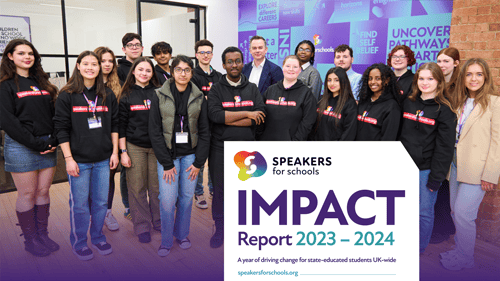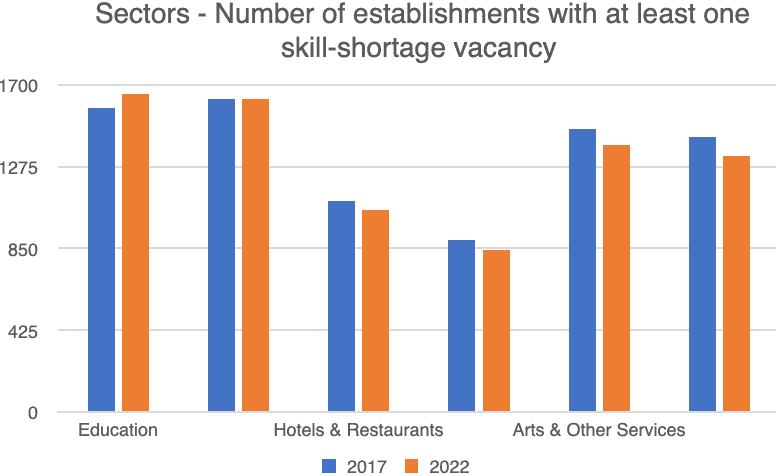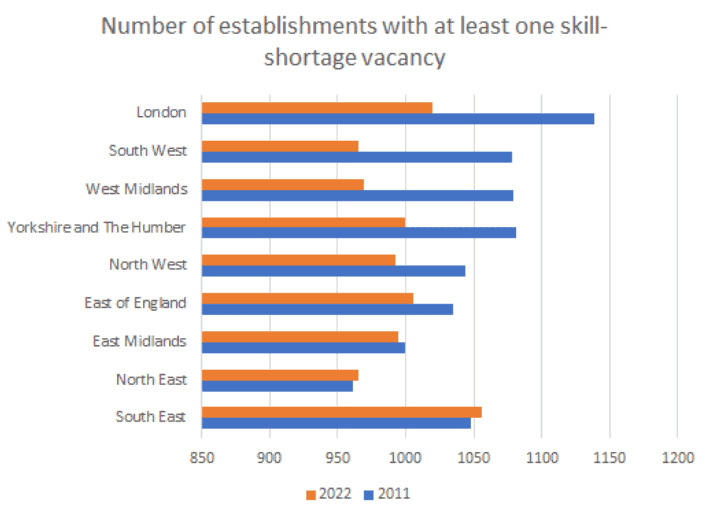Skills shortage increase sends an important message to us all
- Futures For All

- Oct 4, 2023
- 5 min read
Updated: Oct 15, 2025
Our 2023/24 Impact Report reflects a transformative year of empowering young people, breaking barriers, and driving social mobility.
New research from school support organisation, The Key Group provides a valuable overview of the current landscape of work experience in schools and the major gaps in uptake that need urgent addressing. It reveals that just 49% of 14 to 15-year-olds had completed some work experience in the previous academic year, the average time of a placement was under five days, and there are major disparities in access regionally and for both pupils with special educational needs and disabilities (SEND) and those who are eligible for Free School Meals (FSM).

Our CEO, Nick Brook, emphasised our mission here and the inequalities that currently exist in this area:
“Speakers for Schools’ ambition is that every young person has access to high-quality work experience by 2028, yet, right now, this data, alongside our own evidence, suggests more than half of young people leave school having had no work experience whatsoever.
“We know that young people who do have work experience are typically from more affluent families as they often rely on parental networks to arrange it. We cannot have a system that relies on who your mum and dad know, or where they might work, to determine whether you have access to workplaces and potential future employers.”
High quality experiences of the world of work help level the playing field by demystifying careers and building awareness, confidence and networks. Whilst all young people benefit from it, those from the least affluent backgrounds gain the most; partly because it fills the gaps in knowledge that others get through their family networks. Put simply, the more work experience we do, the fairer it gets. Our research on how to make high-quality work experience for all a reality lays out the practical steps and costings to make The Labour Party’s pledge to “guarantee 2 weeks’ worth of work experience for every young person” a reality. We have also explored its impact on young people’s outcomes, the value of virtual work experience and international practices, making us a go-to voice on the topic. The ‘assumed knowledge’ research outlines our additional practical recommendations for addressing inequalities in young people’s access to knowledge of the education system and careers, including greater careers advice and guidance in schools, investment in proven mentoring programmes, and more inspirational talks. Head to our research hub to explore the above and read the full findings from The Key Group here.
About The Key Group
The Key Group are united by a common goal to see all schools thriving. Their best-in-class products provide schools and trusts with the tools and support to flourish, transforming the way over 20,000 state schools operate every day.
New data from the Employer skills survey published September 2023 shows persistent skills challenges that businesses are facing. Over 72,000 employers in multiple sectors were surveyed to provide insight into the evolving labour market, focusing on skill-shortage vacancies, training and skill gaps across all regions in the UK.
Skills shortage is still persistent
UK employers have seen an increase in skills shortage; more than 36% of vacancies across the board were short on skilled applicants in 2022, an increase from 22% in 2017.
Furthermore, the data also shows that one in ten employers had a skills shortage vacancy at the time of being interviewed. This suggests that the gap between employer expectations and the available skills in the local workforce is widening.
This gap is markedly more than in previous years, which could be linked to the impact of COVID-19 and the preparedness of young people entering the workplace for the first time.
Findings from organisations like the Prince’s Trust and Youth Employment UK (YEUK) can help to gain a deeper understanding of the skills gap from a youth perspective. YEUK’s Youth Voice Census 2023 established that a lack of work experience is the biggest barrier young people not in work face. Currently, most are navigating the journey to the world of work, unsure about the skills valued by employers and the route to gaining those skills.
However, despite the barriers they face, Prince’s Trust research finds that more than two-thirds (70%) of young people feel determined to achieve their goals in life, with sixty-four agreeing they can overcome challenges but need help to build their confidence and skills.
While skills shortages are a concern across various sectors, some industries face more significant challenges

In 2022, theEducation, Health and Social Work, and Hotels and Restaurants sectors had the highest number of employers with at least one vacancy due to a lack of candidates with the required skill sets compared to 2017. This is of concern because the Department of Education (DfE) projects that these sectors will employ 3 out of 10 workers in the UK by 2035. Addressing skills shortages in these critical sectors is paramount in ensuring long-term economic growth in the UK.
Interestingly, even employers that did not face skills shortages in their sector indicated that their workforce needed higher skills proficiency. Some of the most significant skills gaps were found in what is seen as typically attractive job markets. Overthe last five years, the Skills Gap density (the proportion of employees judged not fully proficient ) has increased the most in three industries: Financial Services, Business Services, and the Hotels and Restaurants sector.
As AI, digitalisation and the Net Zero economy continue to grow, the skills needed to work in these industries will continue to evolve, thus exacerbating the current skills gap if it is not addressed.
Contrary to a simple North-South divide narrative, this report reveals that the situation is more intricate. The South East, North East, and East Midlands have seen the highest proportion of employees judged as not fully proficient when compared to 2011. In contrast, London, the South West, and West Midlands boast the lowest reported proportions of employees not fully proficient.

Overall, while the number of establishments with at least one skill-shortage vacancy remains high nationally, it has fallen by around 10% in London, South West and West Midlands over the last ten years. In the South East and North East, there has yet to be progress in resolving the skills shortage and the number of employers with at least one skill-shortage vacancy has increased compared to 2011.
Employers with an eye for future talent should start early engagement with education.
The percentage of establishments grappling with at least one skill gap has surged to 15%. Paradoxically, even as employers wrestle with this skills deficit, they seem to be less inclined to invest in staff training, with the percentage of establishments that have funded or arranged any training for their employees over the past year decreasing to 60%, down from 66% in 2017. This shift raises important questions about the reasons behind this decline and the potential solutions to reversing it.
The increasing prevalence of skill gaps across all nations in the UK poses a complex challenge for employers but one that we think can be overcome with early engagement with talent while they are still in education.. We have seen great practices in the past few years, but we need to turbocharge this via employer investment in talent pipeline development. Recognising the value of work placements and other experiences of the workplace in addressing the skills gap at root is the first step towards creating a competitive and resilient workforce pipeline in today’s ever-evolving job market.
We at Speakers for Schools know the health and construction sectors are some of the sectors most engaged to offer work experience. They know too well the costs of the growing skills gap.
The message is clear: We need more sectors and businesses to take action to close the growing skills gap by building early talent pipelines through inspirational talks and meaningful work experience. The sheer size of this growing challenge means we can’t overlook this any longer, or we risk losing our competitiveness as an economy.
Funbi Akande is the Policy Officer at Speakers for Schools. The latest Employee Skills data can be found here.
Footnotes:



